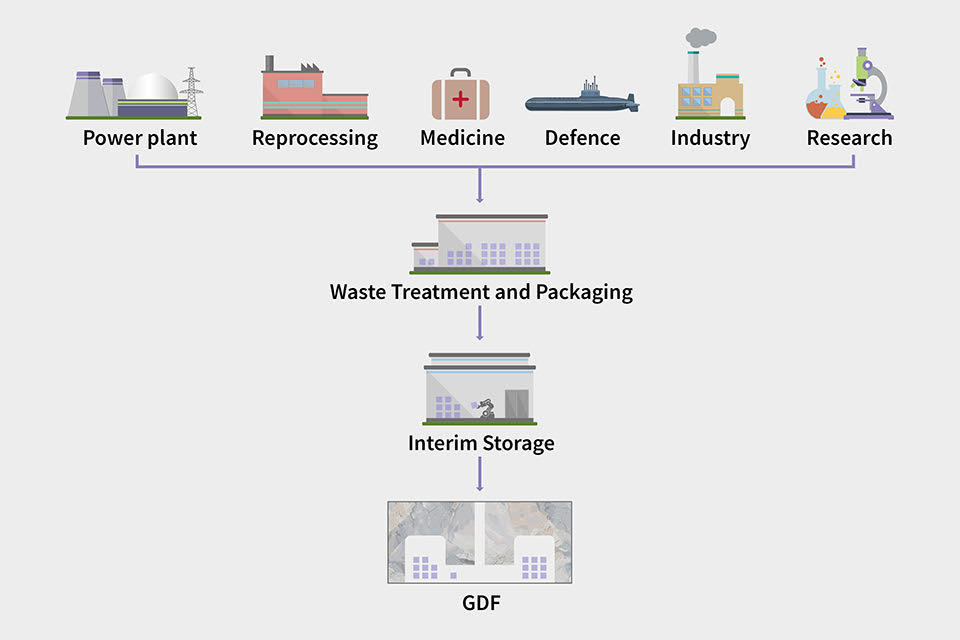Managing our radioactive waste safely
CoRWM recommendations for the long-term management of UK radioactive waste

Nuclear waste hazard symbol
CoRWM was asked by government in 2003 to perform an exercise to develop a series of recommendations for the long-term management of the UK’s higher activity wastes that would both protect the public and the environment, and inspire public confidence. A technical assessment of options was undertaken with ethical considerations, examination of overseas experience and a wide-ranging programme of engagement with both the public and interested parties and stakeholders. The recommendations, published in 2006, form a sound basis for the further development of radioactive waste management policy in the UK, and are still upheld today, with recent CoRWM position papers confirming their continuing relevance.
Read CoRWM’s 2006 Managing our Radioactive Waste Safely, CoRWM recommendations to government report

Where radioactive waste comes from
Recommendation 1
Within the present state of knowledge, CoRWM considers geological disposal* to be the best available approach for the long-term management of all the material categorised as waste in the CoRWM inventory when compared with the risks associated with other methods of management. The aim should be to progress to disposal as soon as practicable, consistent with developing and maintaining public and stakeholder confidence.
*“Disposal” in the context of CoRWM’s recommendations on geological disposal means the burial underground (200 – 1000m) of radioactive waste in a purpose built facility with no intention to retrieve the waste once the facility is closed.
Recommendation 2
A robust programme of interim storage must play an integral part in the long-term management strategy. The uncertainties surrounding the implementation of geological disposal, including social and ethical concerns, lead CoRWM to recommend a continued commitment to the safe and secure management of wastes that is robust against the risk of delay or failure in the repository programme. Due regard should be paid to:
i. reviewing and ensuring security, particularly against terrorist attacks
ii. ensuring the longevity of the stores themselves
iii. prompt immobilisation of waste leading to passively safe waste forms
iv. minimising the need for re-packaging of the wastes
v. the implications for transport of wastes
Recommendation 3
CoRWM recommends a flexible and staged decision-making process to implement the overall strategy, which includes a set of decision points providing for a review of progress, with an opportunity for re-evaluation before proceeding to the next stage.
Recommendation 4
There should be a commitment to an intensified programme of research and development into the long-term safety of geological disposal aimed at reducing uncertainties at generic and site-specific levels, as well as into improved means for storing wastes in the longer term.
Recommendation 5
The commitment to ensuring flexibility in decision making should leave open the possibility that other long-term management options (for example, borehole disposal) could emerge as practical alternatives. Developments in alternative management options should be actively pursued through monitoring of and/or participation in national or international R&D programmes.
Recommendation 6
At the time of inviting host communities to participate in the implementation process, the inventory of material destined for disposal must be clearly defined. Any substantive increase to this inventory (for example creation of waste from a new programme of nuclear power stations, or receipt of waste from overseas) would require an additional step in the negotiation process with host communities to allow them to take a decision to accept or reject any additional waste.
Recommendation 7
If a decision is taken to manage any uranium, spent nuclear fuel and plutonium as wastes, they should be immobilised for secure storage followed by geological disposal.
Recommendation 8
In determining what reactor decommissioning wastes should be consigned for geological disposal, due regard should be paid to considering other available and publicly acceptable management options, including those that may arise from the low level waste review.
Recommendation 9
There should be continuing public and stakeholder engagement, which will be essential to build trust and confidence in the proposed long-term management approach, including siting of facilities.
Recommendation 10
Community involvement in any proposals for the siting of long-term radioactive waste facilities should be based on the principle of volunteerism, that is, an expressed willingness to participate.
Recommendation 11
Willingness to participate should be supported by the provision of community packages that are designed both to facilitate participation in the short term and to ensure that a radioactive waste facility is acceptable to the host community in the long term. Participation should be based on the expectation that the well-being of the community will be enhanced.
Recommendation 12
Community involvement should be achieved through the development of a partnership approach, based on an open and equal relationship between potential host communities and those responsible for implementation.
Recommendation 13
Communities should have the right to withdraw from this process up to a pre-defined point.
Recommendation 14
In order to ensure the legitimacy of the process, key decisions should be ratified by the appropriate democratically elected body/bodies.
Recommendation 15
An independent body should be appointed to oversee the implementation process without delay. CoRWM takes no position on the desirability or otherwise of nuclear new build. We believe that future decisions on new build should be subject to their own assessment process, including consideration of waste. The public assessment process that should apply to any future new build proposals should build on the CoRWM process, and will need to consider a range of issues including the social, political and ethical issues of a deliberate decision to create new nuclear wastes.